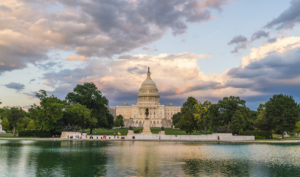
OMB published a list of all the major rules agencies would like to finalize in the upcoming year, Congress passes a bill supporting Hong Kong rights, and more…
IN THE NEWS
- The Office of Information and Regulatory Affairs published its Fall 2019 Unified Agenda and Regulatory Plan, which includes the regulatory plans for over 60 federal agencies, departments, and commissions. The Unified Agenda reflects the Administration’s continued commitment to President Donald J. Trump’s 2017 executive order directing agencies to repeal two rules for every new rule issued. This release of the unified agenda—published biannually—is particularly significant, as it lists the rules agencies will try to finalize before the 2020 presidential election.
- The U.S. Senate and the U.S. House of Representatives passed the Hong Kong Human Rights and Democracy Act that will require the government to issue sanctions on Chinese and Hong Kong ambassadors responsible for human rights violations. The act will require the U.S. State Department to review Hong Kong’s special relationship as separate from mainland China and to recognize altering this status would result in a worse trade relationship between the United States and Hong Kong. The bill still requires the executive’s signature, but the bicameral support is sufficient to override any potential presidential veto.
- California sued the U.S. Environmental Protection Agency (EPA) for revoking a waiver allowing the state to adopt stricter vehicle emissions standards than the rest of the country. “California will not back down when it comes to protecting our people, our health, and our environment from preventable pollution,” California Attorney General Xavier Becerra said. After the agency indicated it would revoke the waiver, four major automakers agreed to voluntarily comply with California’s stricter rules, reportedly prompting an antitrust investigation from the U.S. Department of Justice.
- The U.S. Government Accountability Office (GAO) issued a report finding that EPA has not taken adequate steps to prevent climate change-driven disasters from spreading Superfund site contamination. The GAO asserted that federal data “on flooding, storm surge, wildfires, and sea level rise suggest that about 60 percent” of all sites on the Superfund National Priorities List are susceptible to these effects of climate change. The report makes four recommendations, including suggestions that EPA should better integrate climate change risk data into Superfund site risk assessments. EPA disagreed with three of the four recommendations.
- New York sued e-cigarette company JUUL for allegedly using misleading advertising and intentionally marketing its products to teens. “There can be no doubt that JUUL’s aggressive advertising has significantly contributed to the public health crisis that has left youth in New York and across the country addicted to its products,” state Attorney General Letitia James said. The same day, the American Medical Association called for a total ban of vaping products not approved by the U.S. Food and Drug Administration.
- The District Court for the Southern District of California blocked the asylum ban—also called the “third-country asylum bar”—for immigrants in Mexico issued by the Justice Department. The Justice Department argued that because certain the people bringing the lawsuit never attempted to enter or arrive in the United States, the asylum ban should have been upheld. Judge Cynthia Ann Bashant wrote: “Today’s ruling is an important one for the thousands of asylum seekers who followed the ‘rules’ and waited for their turn, only to be told they were out of luck once the new ban was announced.”
- The U.S. Department of Homeland Security (DHS) issued a final rule implementing its Asylum Cooperative Agreements with El Salvador, Guatemala, and Honduras. Under the rule, DHS may remove asylum seekers to participating third nations unless DHS officers are convinced that it is more likely than not that the asylum seeker would face a resulting threat to their life or freedom. Refugees International president Eric Schwartz said that “rampant violence and crime” in El Salvador, Guatemala, and Honduras, combined with the fact that they “simply do not have the infrastructure in place to process asylum claims,” make these countries unsafe for asylum seekers.
- The U.S. Department of Commerce extended a temporary license authorizing U.S. companies to do business with Chinese telecommunications firm Huawei. The Commerce Department placed Huawei on its so-called entity list—a list of companies that U.S. firms need a license to transact with—after finding that the company engaged in “activities that are contrary to U.S. national security or foreign policy interests.” U.S. Commerce Secretary Wilbur Ross said that the extension was necessary to “allow carriers to continue to service customers in some of the most remote areas of the United States who would otherwise be left in the dark.”
- The California Department of Conservation suspended new permits for any fracking operations that use high-pressure steam to break into underground oil deposits. California Governor Gavin Newsom said that “these are necessary steps to strengthen oversight of oil and gas extraction as we phase out our dependence on fossil fuels and focus on clean energy sources.” The announcement also included the regulation of oil and gas extraction facilities by prioritizing public health and safety.
WHAT WE’RE READING THIS WEEK
- Traditional cost-benefit analysis may be inappropriate as applied to tax regulation, Greg Leiserson of the Washington Center for Equitable Growth and Adam Looney of the Brookings Institute argued in a new report. The U.S. Department of the Treasury and the U.S. Office of Management and Budget (OMB) recently agreed to a new process that would subject more tax regulations to stricter economic review, Leiserson and Looney wrote. But the standard approach to economic analysis would “bias the regulatory process against raising revenue and stopping abuse,” they argued. Instead, Leiserson and Looney suggested that the agencies should only conduct an economic analysis of tax regulations in limited circumstances, and should not attempt to estimate net benefit since this would entail “controversial assumptions about the social value of revenues and the appropriate distribution of the tax burden.”
- In a forthcoming article for the Albany Government Law Review, Professor Kathy L. Cerminara of Nova Southeastern University criticized proposals from the U.S. Department of Health and Human Services that would make it legal to refuse providing transgender patients with certain services based on a health care professional’s religious beliefs. These proposals, according to Cerminara, would contradict the goals of the Patient Protection and Affordable Care Act, specifically the provisions that prohibit discrimination within “any health program or activity” on the basis of race, color, national origin, sex, age, or disability.
- In a new policy paper, Colin Grabow of the Cato Institute argued that the Jones Act has significantly impaired the domestic shipbuilding industry, and should be repealed. Although the law is often justified as essential to national security because it authorizes leveraging private shipbuilding and repair in times of war, Grabow wrote, the Jones Act’s protectionism has resulted in a decline of the merchant marine with the result that there are few resources to leverage. Grabow concluded that, given these failures, Congress should repeal the law and create a domestic merchant marine reserve, subsidize merchant marine wages, or authorize wartime use of foreign marine crews.
FLASHBACK FRIDAY
- Professor Philip E. Rubin of Yale School of Medicine discussed in The Regulatory Review how the common set of regulatory provisions that protect human subjects—known as the Common Rule—came during a period where medicine was raising new ethical issues. According to Rubin, the Common Rule may need to be revised as scientists begin experimenting with gene editing and personalized medicine.



